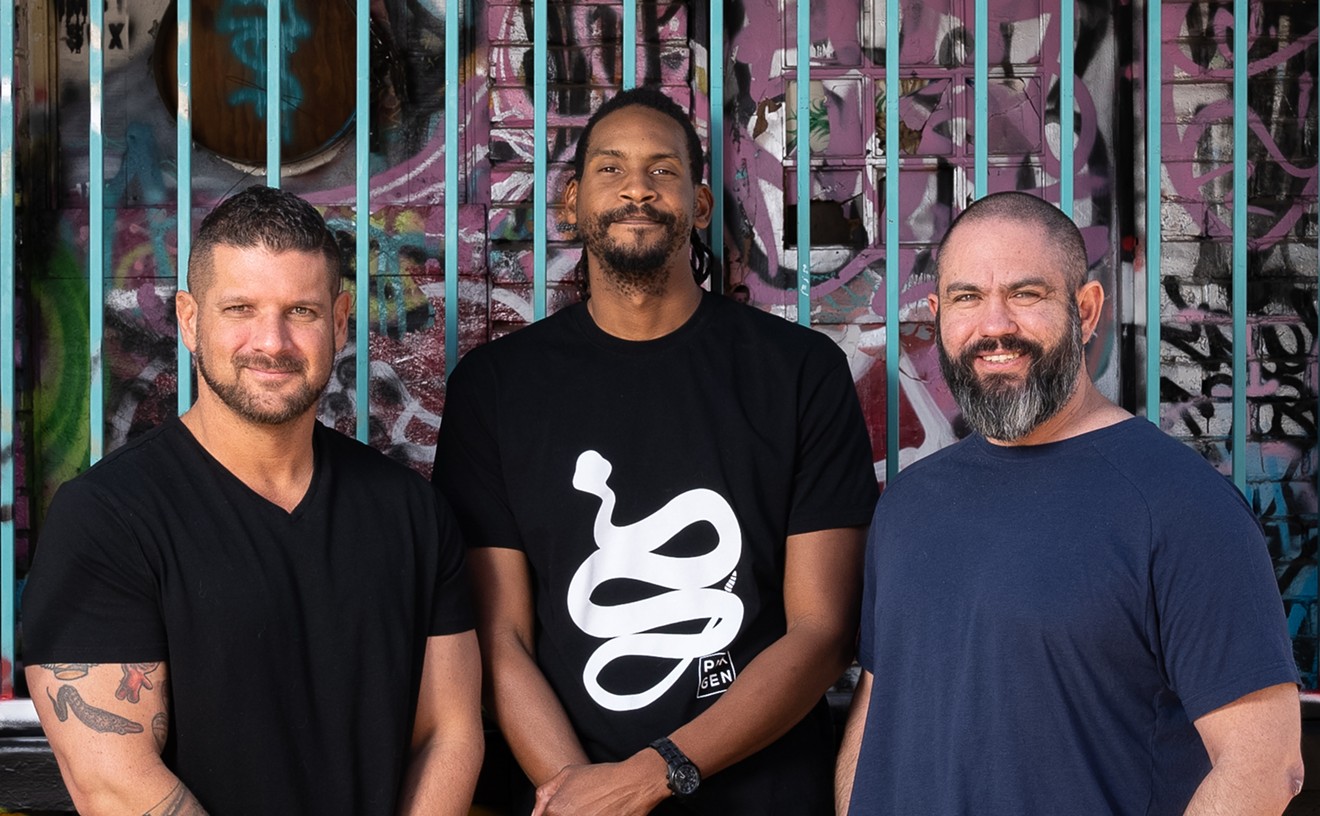That's Crichton's plaintive refrain in Disclosure, and it's also David Mamet's in Oleanna, another current film about a well-to-do, upper-middle-class white guy under siege in the workplace by a devious, calculating woman. They're just honest, hardworking sorts, the authors seem to be saying of their heroes; why do you scheming bitches want so badly to destroy them?
Disclosure is intended as dishy Hollywood entertainment, and Oleanna as hard-hitting political theatre, but both involve something that male writers seem to be fretting about lately--the idea of sex being used against us as a weapon. The more discreet response might be to feel welcomed to the club.
Poor Michael Douglas. He's the Fay Wray of the modern era, and having been lucratively menaced by such Queen Kongs as Glenn Close, Kathleen Turner and Sharon Stone, has gotten himself a new distaff monster who finds him so irresistible, she'll destroy him before she'll take no for an answer. This time the she-beast is Demi Moore, who plays Douglas' boss in Disclosure.
Crichton's plot, which is reportedly based on a real-life case, concerns a sexual harassment charge made by a male executive of a computer company against his attractive, sexually aggressive female boss. True story or not, the setup comes across as fairly contrived--he (Douglas) is up for a vice presidency when she (Moore), an old girlfriend with whom he has a particularly hot sexual history, gets the job instead. He's upset, but decides to make the best of it, and when she invites him to her office for an after-hours drink, he accepts. She instantly, almost assaultively, begins making advances at him, and after a minute or two of acquiescence, he breaks away from her--he's married--and leaves the office. She is outraged, and the next day tells her bosses that he attacked her. He's offered a transfer to a dead-end position, but instead gets a lawyer and sues, confident that the company, which is on the verge of a merger, will settle. As he and his allies probe the matter, they begin to see that the allegation against him is part of a complex web of industrial intrigue. The happy news about the film of Disclosure is that the director, Barry Levinson, and the adapter, Paul Attanasio, have thrown most of Crichton's dreary debate about sexual harassment in the workplace over the side. Whenever the questions that supposedly constitute the central theme rear their heads, the movie is in danger of collapsing, but when the focus is on the high-tech intrigue, Disclosure is a crackerjack industrial-espionage thriller, despite some double-take-prompting inconsistencies of characterization. The choice of Levinson as the director of Disclosure marks the second time that a good Hollywood liberal has been brought in to tidy up one of Crichton's reactionary books (tidy it up for the critics, that is; the public doesn't mind the occasional reactionary movie). Precisely because of his delight in the Asian imagery, Philip Kaufman made an exotic thriller out of the first half of Crichton's protectionist rant Rising Sun. Kaufman pushed the cautious PC revisionism too hard in the second half, and the film fell apart, but it was still better than the vague, unpersuasive didacticism of the novel.
In the same way--but with much more success--Levinson and Attanasio and the actors revel in what Crichton, in Disclosure, wants to present as terrifying--the treacherous, sexually volatile atmosphere of a high-rolling firm. They bring it to bitchy, funny, gleefully suspenseful life.
Disclosure isn't remotely a great movie. Douglas' hero is a shoddily pasted-together excuse for a character--he acts like an imbecile at the beginning of the film, then later displays intuitions that would impress Sherlock Holmes--and Moore's Spider Woman isn't a character at all; she's just a projection. Most of the secondary characters are similar pageant figures--the tyrannical boss, the obsequious corporate lawyer, the boy-genius computer whiz, the outraged wife. But Disclosure is good trash. Attanasio, who wrote Quiz Show, gives Crichton's earnest, functional dialogue a massive makeover, and it comes out as wisecracking repartee, not quite on the Ben Hecht level, maybe, but not unfit to be mentioned in the same sentence as Hecht, either. Levinson orchestrates the performances of the large cast beautifully, helping actors fast-talk their way past the thinness of the roles.
Levinson's direction of the actors is certainly his main contribution to Disclosure. The standout is probably Caroline Goodall, as the least pillish wife that any movie hero has had in a while (she's clearly the brains in the marriage). Donald Sutherland hams it up entertainingly as the bileful boss, comedian Dennis Miller acquits himself in a small role, and Allan Rich's line readings, as Moore's dour attorney, are the quintessence of the phrase "dry as dust."
Yet this film also represents Levinson's best work as a hired-gun director (as opposed to such more personal works as Diner and Avalon). Even Bugsy, good as the best of it was, seems visually stiff compared to Disclosure. Levinson's camera movement here never seems showy, but it has an almost insouciant freedom and inventiveness, and Ennio Morricone's ominous music gives the film both tension and an edge of irony.
That's the key, perhaps--that Levinson simply isn't taking the material too seriously. Once the Big Scene in the office ends--in context, it's much more funny than either sexy or scary--it's as if the director had completed his contractual obligation to provide the studio with a steamy trailer, and the film immediately loosens up and starts to be fun. I'd guess that Levinson was already smirking behind the camera when he filmed the rejected Moore following Douglas down the stairs, bellowing, "Come back here and finish what you started! Finish what you started or you're dead!" I don't mean to suggest that harassment isn't a great subject, only that Crichton's thematic imagination, which is as dull as his facility for plot is fertile, is unlikely to do it justice. Crichton is a wizard at finding dramatic structures for dramatizing scientific and cultural issues. But he's like an idiot savant of plot--his tales are readable and exciting, but the characters are just names on stick figures, and their conversations are accordingly wooden. Besides, the big concerns that supposedly are the heart of his books don't stand up to a lot of scrutiny. Genetic research can breed monsters! The Yellow Peril is taking over our economy! Even if you agree that these may be dire matters, Crichton's treatments of them beg obvious questions. In Disclosure, he gives us a woman laying a man low with a single false accusation--having trumped up the circumstances by which she'd be believed--then laments the helplessness of men in the face of such charges.
Shamelessly, Crichton has suggested that Disclosure can be read as a turning of the tables, a way for men to see the sordidness of harassment. It's supposed to be edifying for us lunkheads, the same way that Kramer vs. Kramer and Tootsie and Mrs. Doubtfire and now Junior are all supposed to be (even though these films were made by men). Yet the weakness of Crichton's nonargument remains even if you buy his line of disingenuous horseshit about therapeutic role reversal. Whatever the genders of the parties involved, the slight rise in potential gain from falsely accusing a co-worker of sexual harassment is an inevitable part of the societal price for regarding harassment as a serious crime. Is Crichton saying we shouldn't?
In some respects, David Mamet's talent is like a mirror-image of Michael Crichton's--Mamet's plotting tends to be gappy and uninspired, but his stylized dialogue can, when well-performed, attain a jittery, poetic pulse that makes the half-finished phrases and italicized mots justes sound strangely lucid. He has written at least two great plays (Glengarry Glen Ross and his little-known existential tragedy Edmond). He could learn a thing or two from Crichton about structure.
As a composer of idiosyncratic talk, however, Mamet is one of a kind. A minor gift of this major dramatist is Mamet's ability to craft the intolerable line--the remark so vile that the only conceivable response, in Mamet's view, is violence. "I said, your friend died screamin' like a stuck Irish pig. Now you think about that when I beat the rap." In Mamet's screenplay for The Untouchables, Frank Nitti says this to Elliot Ness, for which Ness throws Nitti off the roof of a building. Mamet demonstrates this skill again in the screen version of Oleanna, his stark, two-character stage diatribe about sexual politics on campus. Having destroyed the career of a 40ish college professor (William H. Macy) with an absurd and politically motivated charge of harassment, a co-ed (Debra Eisenstadt) happens to overhear the man talking to his wife on the telephone, and corrects him: "Don't call your wife 'baby,'" and this presumption touches off a ferocious explosion in the beleaguered prof.
Oleanna begins with the student approaching her teacher, obtusely angry because she can't understand his book and is failing his liberal arts course. He treats her in a dismissive manner at first, but when he realizes how upset she is--she's nearly hysterical--he begins to speak to her more sympathetically. His book is a polemic against authoritarianism in education (dramatic irony), so he decides to put his theory where his mouth is. He tells her he'll change her grade to an "A" if she'll come to his office now and then.
Uh-oh.
As presented here, this proposition, and several other misreadable comments and gestures, clearly is not intended as a come-on--indeed, it would be hard to find characters in Western drama as devoid of sexuality as these two. We're supposed to see that the poor prof is only guilty of colossal, arrogant carelessness (at the moment that the prof starts unwittingly screwing himself, Mamet has him walk under a ladder).
Yet in the subsequent two acts, the co-ed is a different person--a confident, unshakably articulate spokesperson for a campus feminist organization (to which, ominously, she refers only as "my group"). The prof, whose tenure her complaint has endangered, is systematically reduced from trying to reason with her to panicky begging to violent rage. As cinema, Oleanna is negligible. Mamet directed it himself, in a smooth, unobtrusive style, with a few nods to visual "opening out." As a melodrama, it plays fairly well--an ugly-spirited but gripping and theatrically effective dramatization of a white guy's furtive, masochistic fantasy. It really can't be regarded as more than that, because as a coherent, realistic drama, it simply doesn't add up. Mamet probably regards the burst of violence with which the play ends as a sign of "balance," an acknowledgment that when we guys feel sufficiently cornered, we will revert to physical brutality in an attempt to prove our dominance. But this, like Crichton's role-reversal claim with Disclosure, is a dodge, though perhaps an instinctive, unconscious one. There are only two ways to interpret the role of the co-ed--she's either an extortionist or the gull of extortionists. Thus, under the very weird, improbable circumstances which Mamet sets up, most people would probably consider the prof's savage reaction understandable--not conscionable, of course, but understandable. The "PC Wars" now being waged on American college campuses are a serious matter, no question, but to suggest that the melodramatic construct on which Oleanna hinges is relevant to that conflict is laughable. Considered closely, the matter boils down to this: If you've truly harassed somebody, you should be called on it. If you haven't, and someone falsely or frivolously accuses you of doing so, that's horrible and rotten, but it's also nothing that couldn't have happened to you at any point in history. The only difference is that now, sometimes, the accusation may be taken seriously enough to threaten career and reputation, whether it's true. That's the part that seems to bother Mamet and Crichton.










